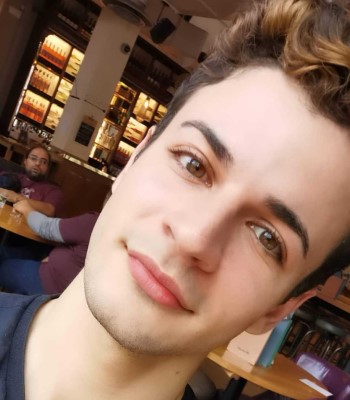Ruben Tomás Case Study

“My motivations and passions continue to be to expand my skillset but also stem from wanting to innovate new technologies with clinical importance.”
Interdisciplinarity is at the heart of Ruben’s EPRRC-funded PhD research project which could impact the future design of cell-based therapies.
My PhD studentship is fully funded by the EPSRC through the Centre for Doctoral Training in (Molecular Analytical) Science, and is supervised by Prof. Matthew Gibson (Chemistry/ Warwick Medical School) and Dr Daniel Mitchell (Warwick Medical School).
We’re engineering cellular interfaces with synthetic macromolecules using metabolic glycan labelling. Essentially we are chemically attaching polymers to sugars on the surface of living cells.
Currently Cell surface functionality is largely programmed by genetically encoded information through modulation of protein expression levels, including glycosylation enzymes. Genetic tools enable control over protein-based functionality, but are not straightforward to adapt to recruit non-native functionality and can introduce genetic defects which require extensive manufacturing procedures.
Our solution is to re-engineer cellular interfaces with synthetic polymers and nanomaterials using metabolic glycan labelling, a technique that allows installation of unnatural glycans with bio-orthogonal functional groups to the cell surface, provides the necessary platform to introduce non-native functionality, tune biological responses and allow selective recruitment of therapeutic and/or imaging payloads.
I am also interested in the Cryopreservation of mammalian cells with synthetic antifreeze protein mimics; high resolution imaging and tracking of synthetic nanomaterials; synthesis of therapeutic polymer and polymer-peptide conjugates for recruitment to unnatural cell surface bound glycans.
I have always wanted to do a PhD which sits at the interface of chemistry and biology in order to advance biomedical technology. So my initial motivation for doing a PhD was to develop the necessary skills and integrate my previous knowledge into a field that I was interested but unfamiliar with. Now, my motivations and passions continue to be to expand my skillset but also stem from wanting to innovate new technologies with clinical importance.
Following the completion of my undergraduate degree, a PhD seemed the ideal choice to further progress as a scientist, especially in research due to the wealth of knowledge and advanced facilities provided by universities.
As a PhD student in a highly interdisciplinary field the typical day rarely exists, however the format of my projects tends to be consistent. Firstly, there is an element of synthesis which is carried out in the Department of Chemistry to produce a library of synthetic polymers of interest with full characterisation being achieved using state-of-the-art equipment including NMR, MS, UV-VIS, DLS, TGA, SEC and many more. Secondly, cell-based assays are completed which are tailored towards the synthetic macromolecule being studied but can range from cytotoxicity/ cytocompatible, cell surface expression of markers and functional assays. Finally, sophisticated analytical techniques located in the School of Life Science and Warwick Medical School are used to either complete the assays or further probe the mechanistic understanding of cell surfaces re-engineering with synthetic macromolecules including confocal microscopy, flow cytometry and microbiology techniques. I have been very fortunate to have been able to work across multiple Warwick departments to obtain exposure to a variety of expertise and techniques.
A PhD in general is a journey of personal and career development. World leading training was provided from day 1 to ensure that I had the necessary means to carry out my PhD and develop as a scientist. If I required training that was outside of the current skillset of my group then external training was obtained either from other departments at the University of Warwick or by employing industry members. As my skills progressed the number of collaborations increased both internal and external. In addition, multiple opportunities were provided to enhance teachings skills in the form of demonstrating laboratory sessions. Opportunities to attend and present in conferences are endless, allowing your research to be advertised, increase insight into science of current interest and building connections (even internationally). Transferable skills courses are also encouraged to enhance multiple skills required for all future careers including teambuilding, science communication, leadership and many more.
Supervisors at Warwick are highly approachable so I would suggest investing time in meeting with them to discuss PhD placements on offer, the potential creation of one that suits your ambitions and/ or to explore the facilities available. A PhD is one of the hardest mental and physical challenges you will face, so selecting one that you are truly interested and motivated in will help push pass the periods of struggle. Always remember that PhDs can be highly interdisciplinary and an entry route to a completely new avenue of science.
